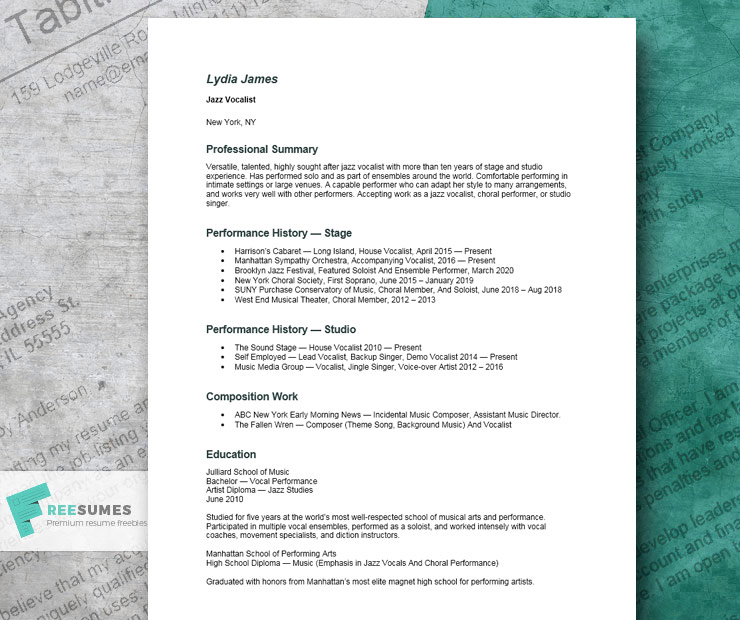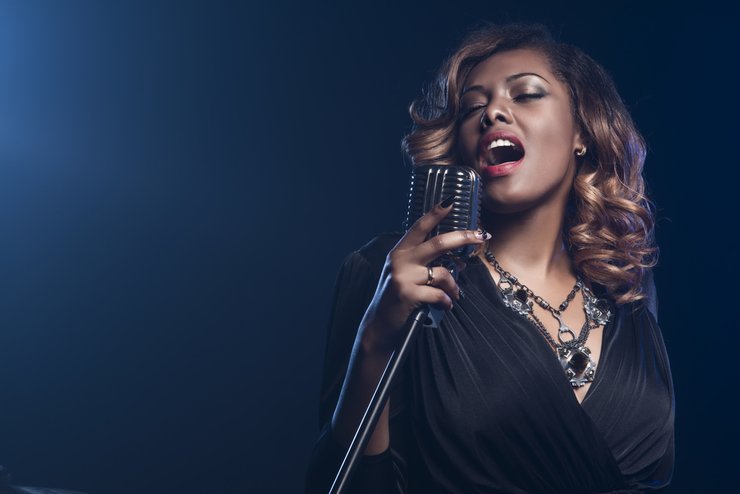For a working musician, the most important part of the hiring process is the audition. However, it isn’t the only factor to consider. Most jobs also require that you submit a completed resume, cover letter, and other documents. Your resume is a central document here as it must highlight your experience, skills, and your unique musical point of view.
So how do you go about creating such a resume? We’ve got tips, followed by a detailed music resume example.
Include All Relevant Information For Each Employment Entry
Employment history is the most important section of your resume. Why? Because each decision-maker will scan it in search of deets that are relevant to them. Make that information stand out. In particular, here are several key points every musician resume should include:
- The name of the band, orchestra, or organization you play with
- Your section or role
- Your chair position
- The instruments you played
- The terms of the gig (e.g.: regular or substitute, long or short term gig, touring or studio)
Are You Writing a Performance or Composition Resume?
If you are applying for a position as a performer, your resume should be the standard length of one page. If you are writing a composition or other non-performance resume, the document can be longer. This is because you will be going into details about all of your relevant experience, affiliations, and gigs.
Create a List of Principal Teachers
If you are a recent graduate or learned your profession from the best, add the list of principal teachers to your resume, but:
- Do not list instructors you only worked with briefly.
- Give details, but be brief.
- If you have taken a masterclass, list it. Just be sure you disclose it was not a long term student/teacher relationship.
Bullet Point Your Performance Employment History
If you look at a musician’s resume, you will notice that the employment section doesn’t look ‘standard’. This is because it’s common to list performances as one-line bullet points.
Further, some musicians may opt to divide their professional history into subcategories. For example, one section for on-stage performance, one for studio and composition work, and one for teaching work. Keep in mind that because work as a musician is often varied and short term, it’s common for jobs to overlap one another. Employers are also less concerned about gaps in your employment history.
Music Resume Sample (Word version)
Here is a sample resume that can be used for a job as a musical performer.

Download resume example (.docx)
Music Resume Example (text version)
Lydia James — Jazz Vocalist
New York, NY
Professional Summary
Versatile, talented, highly sought after jazz vocalist with more than ten years of stage and studio experience. Has performed solo and as part of ensembles around the world. Comfortable performing in intimate settings or large venues. A capable performer who can adapt her style to many arrangements, and works very well with other performers. Accepting work as a jazz vocalist, choral performer, or studio singer.
Performance History — Stage
- Harrison’s Cabaret — Long Island, House Vocalist, April 2015 — Present
- Manhattan Sympathy Orchestra, Accompanying Vocalist, 2016 — Present
- Brooklyn Jazz Festival, Featured Soloist And Ensemble Performer, March 2020
- New York Choral Society, First Soprano, June 2015 – January 2019
- SUNY Purchase Conservatory of Music, Choral Member, And Soloist, June 2018 – Aug 2018
- West End Musical Theater, Choral Member, 2012 – 2013
Performance History — Studio
- The Sound Stage — House Vocalist 2010 — Present
- Self Employed — Lead Vocalist, Backup Singer, Demo Vocalist 2014 — Present
- Music Media Group — Vocalist, Jingle Singer, Voice-over Artist 2012 – 2016
Composition Work
- ABC New York Early Morning News — Incidental Music Composer, Assistant Music Director.
- The Fallen Wren — Composer (Theme Song, Background Music) And Vocalist
Education
Julliard School of Music
Bachelor — Vocal Performance
Artist Diploma — Jazz Studies
June 2010
Studied for five years at the world’s most well-respected school of musical arts and performance. Participated in multiple vocal ensembles, performed as a soloist, and worked intensely with vocal coaches, movement specialists, and diction instructors.
Manhattan School of Performing Arts
High School Diploma — Music (Emphasis in Jazz Vocals And Choral Performance)
Graduated with honors from Manhattan’s most elite magnet high school for performing artists.
Master Classes
- Dr. Anita Walker, Operatic Vocal Consortium April 2019 at Julliard
- Rev. Patricia Wallace, Choral Performance Workshop, October 2018 at New York Choral Institute
- Herbie Hancock, Brooklyn Jazz Festival Masters Series, February 2016
Memberships
United States Federation of Jazz Vocalists, Charter Member 2010 — Present
Julliard Alumni Association 2010 — Present
American Society of Cabaret Singers 2016 — Present
Recordings
Manhattan Sympathy Orchestra Holiday Performance, Dec. 2018 (MSO Records)
New York Choral Society Best Performances 2014 – 2019, January 2020 (Choral Recordings Inc.)
Final Thoughts: Don’t Stray Too Far
As you write your resume, make sure the experience you include is relevant to the position. For example, in the example above, the applicant is a jazz singer with some choral performance and cabaret experience. Those are all close enough to be relevant if the applicant was vying for a job as a jazz vocalist.
Now, imagine the applicant also worked as a hip hop performer or rock vocalist. This is certainly a musical experience, but wouldn’t be a good fit for this resume.






